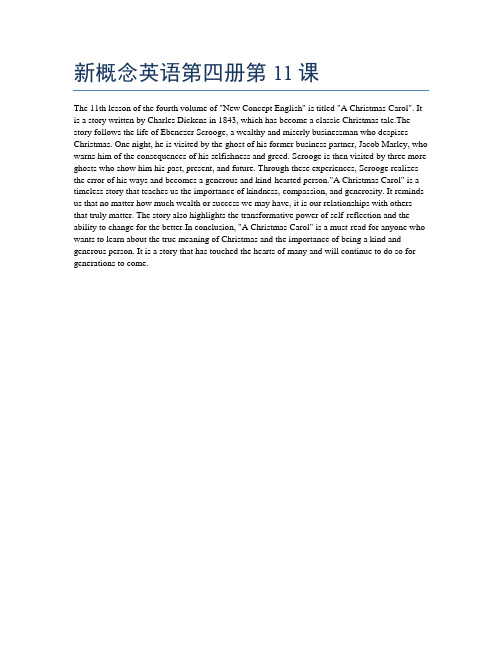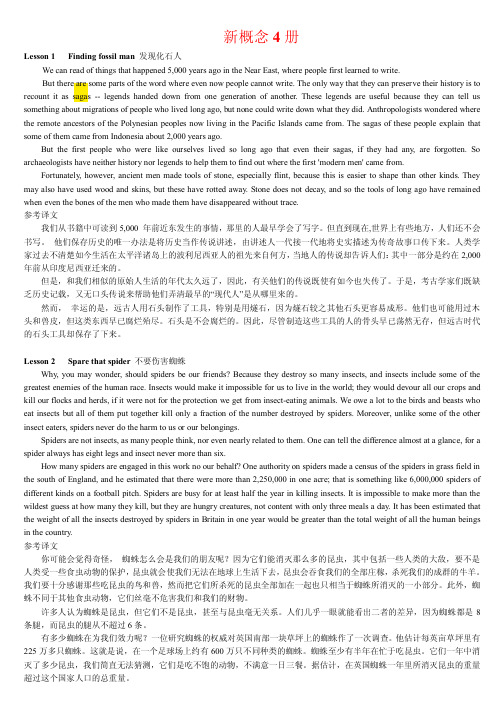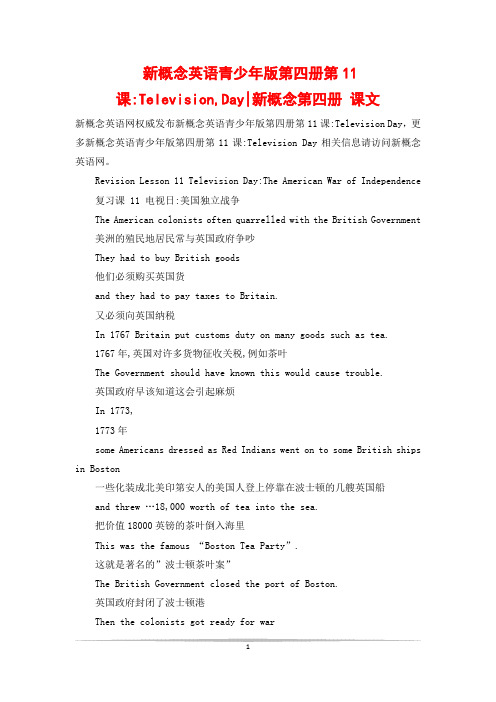新概念英语第四册第十一单元课文原文
新概念英语第四册第11课

新概念英语第四册第11课The 11th lesson of the fourth volume of "New Concept English" is titled "A Christmas Carol". It is a story written by Charles Dickens in 1843, which has become a classic Christmas tale.The story follows the life of Ebenezer Scrooge, a wealthy and miserly businessman who despises Christmas. One night, he is visited by the ghost of his former business partner, Jacob Marley, who warns him of the consequences of his selfishness and greed. Scrooge is then visited by three more ghosts who show him his past, present, and future. Through these experiences, Scrooge realizes the error of his ways and becomes a generous and kind-hearted person."A Christmas Carol" is a timeless story that teaches us the importance of kindness, compassion, and generosity. It reminds us that no matter how much wealth or success we may have, it is our relationships with others that truly matter. The story also highlights the transformative power of self-reflection and the ability to change for the better.In conclusion, "A Christmas Carol" is a must-read for anyone who wants to learn about the true meaning of Christmas and the importance of being a kind and generous person. It is a story that has touched the hearts of many and will continue to do so for generations to come.。
新概念英语第四册Lesson11Howtogrowold课件

• in the thought that....: because they think that...
• The Swedes were the first to recognize that public officials like civil servants, police officers, health inspectors or taxcollectors can make mistakes or act over-zealously in the belief that they are serving the public.
• vital / vigorous • energetic / dynamic • vital signs
• weariness n. 疲惫,疲劳 • weariness weary • fatigue fatigued
• I‘m weary / fatigued / exhausted / tired out / dog-tired / worn out / drained / beat / bushed.
• joys and sorrows: ups and downs • whatever work (that/which) it was in him(=within his ability) to do
• somewhat / to some extent / more or less
• ego n. 自我 • super-ego • egoism • egocentric: self-centered
• suffer from • be afflicted by/with... • He is afflicted by / with diabetes / a sense of inferiority
新概念英语第4册课文及译文

fo emag s'dlihc a revo woble reh gnivom yb ,llits regnarts ,dna neercs euqapo na hguorht repapswen a daer ot elba saw ehs stset eseht
gniruD .cilbupeR laredeF naissuR eht fo htlaeH fo yrtsiniM eht fo noissimmoc laiceps a yb stset fo seires a nevig saw ehs lirpA ni dna .seldnub ni pu enod erew yeht yaw eht debircsed neve dna ,ereht yawa dekcol
册 4 念概新
双上蒙不果如。的着蒙是都眼双的拉维�中验实些这有所在�力能觉感的似类有肩双和盖膝的她�明表验实他其。色颜和廓 动移上牌纸”托罗“的玩童儿在部肘把她�是的怪奇为更。纸报读幕屏的明透不着隔能她�中试测些这在。试测的列系一了行 进她对会员委别特个一部生卫斯罗俄�里月 4。意注的位单研科个一城克斯夫诺扬里乌近附家她了起引能功异特的拉维 。况情的扎捆纸报了说还�里子柜在锁纸报旧的多么这把么什为亲 墙的实坚穿看至甚�西东认辨位部同不的肤皮用能还她但�样一人常与力视的她。生学岁 11 的娃洛托彼.拉维叫名个一有到 谈例一有中其 。西东到看墙和门的实厚过透能至甚�色颜认辨和字识书看指手用能人有�例事个几了导报近最斯罗俄 .tew erew sdnah reh 文 译 考参 父问然突她�上门的柜险保的着锁个一在放手把然偶�室公办的亲父进走拉维�天一。的能功一这她现发先首亲父她是。壁 轮的画幅一的面下毯地在藏出别识步脚用能�鞋拖和子袜筒长着穿她�次一有还。色颜和字数的上牌纸在印出说能便�下一
汇总新概念英语第四册课文原文

20 年 月 日A4打印 / 可编辑此翻译文本仅供参考请以法文原文为准(此翻译文本仅供参考,请以法文原文为准) 几内亚共和国出入境管理条例第一章入境签证第1条:一次或多次入出境签证须签在有效护照或旅行证上,并在申请表上注明交通工具、入境地点、事由及逗留时间。
——入境签证有效期3个月,此为使用签证最长期限,过期作废。
——逗留期自入境之日起不得超过3个月。
——入境地点指外国人入境的官方口岸。
第2条:入境签证发证机关:在几内亚,国家安全部和国家安全总局长;在国外,请示国家安全部意见后,由几内亚使领馆签发。
第3条:在国外仅签发一次入出境签证。
抵几后,根据申请者意愿,可签发多次往返签证。
第4条:申请入境签证须提供:入境事由、旅费证明、往返机票、两张身份照片及印花税费。
第二章过境签证第5条:在下述情况下可发给过境签证:——从陆路穿越国境——从空、海、陆中转——交通工具发生故障第6条:未有签证的外国人可在官方指定口岸滞留,费用由运载方负担。
第7条:过境签证持有者须在规定时间和地点进出国境,滞留期自抵境之日起不得超过五天。
第8条:申请过境签证须提供:有效护照或旅行证、过境申请、两张身份照片及印花税费。
因运输工具故障而被迫滞留,口岸警察局可签发过境签证。
第三章免签证第9条:过境飞机和船舶的机组和乘组人员凭乘务证可入境。
第10条:与几内亚有免签证协议的国家公民可持护照入境滞留,每次不得超过三个月。
持有国籍证的几内亚邻国公民,可在边境区域内免护照和签证自由进出。
第11条:下述外国人免签证:——在几内亚港口泊转的船员不离船;——乘飞机过境人员不出中转区。
第12条:禁止对公共秩序构成威胁或被驱逐的外国人入境。
第四章对空海运载人员的规定第13条:空海运载人员只能接受符合入几条件和有返程保证的外籍旅客。
否则,他必须承担非法入境旅客在几逗留期间的生活费用和返程旅费。
非法入境旅客刑期届满后才得返程。
第五章临时居留第14条:外国人在几内亚逗留5-90天,视为临时居留。
新概念英语第四册第11课全文句子成分分析

Lesson 11 How to grow old 如何安度晚年Some old people are oppressed by the fear of death. In the young there is a justification for this feeling. Young men who have reason to fear that they will be killed in battle定语may justifiably feel bitter in the thought同位语that they have been cheated of the best things 定语that life has to offer. But in an old man 定语who has known human joys and sorrows, and has achieved 宾语whatever work it was in him to do, the fear of death is somewhat abject and ignoble. The best way 定语to overcome it -- so at least it seems to me -- is to make your interests 宾补gradually wider and more impersonal, until bit by bit 主语the walls of the ego recede, and your life becomes 表语increasingly merged in the universal life. An individual human existence should be like a river -- small at first, narrowly contained within its banks, and rushing passionately past boulders and over waterfalls. Gradually the river grows wider, the banks recede, the waters flow more quietly, and 状语in the end, without any visible break, they become merged in the sea, andpainlessly lose their individual being. The man 定语who, in old age, can see his life in this way, will not suffer from the fear of death, since the things 定语he cares for will continue. And 状语if, with the decay of vitality, weariness increases, the thought of rest will be not unwelcome. I should wish to die while (省略I am)still at work, knowing that others will carry on 宾语what I can no longer do, and content in the thought 同位语that what was possible has been done.。
英语泛读教程第四册unit11中文

人名乔治·斯提沃特 1你知道美国人取名习惯主要的传统来源吗?印第安人和黑人是如何获得自己的姓氏的?为什么移民要采用美国化的姓名?下面的文字讨论这些问题。
2在任何民族的人类学研究中,取名的习俗往往非常重要,而且包含许多内容。
因此,我们很可以对美国人的取名习俗作一番研究。
3名字是语言的一部分,然而,由于它们代表的是非常特殊的一部分,我们无法将其归入一般的讨论中。
特别是,后来移民的影响和原来习俗的发展变化,对我们的名字来说已经比一般的语言更重要了。
4和许多其它习俗一样,我们取名的习惯承袭了英国传统,尽管和整个欧洲的习俗也差别不大。
根据英国的传统,一个人的名字由两部分组成:名和姓,名在前姓在后。
这一传统形成于中世纪,远远早于美国的任何殖民地形成之前。
国王和贵族,偶尔某些级别较低的人,可以有不止一个名。
在移民到美国来的人的孩子中,后来被称做“中间名”的,已很少见,几乎消失了。
可以举出的这样的例子非常少,其中一个奇怪地叫做爱德华·玛利亚·英费尔德,是詹姆斯镇第一任地方议会的主席。
5由于从一开始移民们就有姓氏,而姓氏是继承的,早期的殖民者只不过保留他们已有的姓,对此没有多少可说。
然而人们提出了这样的问题,是不是所有早期的英国移民实际上都有姓?有这样的疑问,是因为在詹姆斯镇最早的名单中,有“老爱德华”这样的名字。
情况很可能是,他确实有一个姓,只不过由于疏忽从名单上略去,而在他死后也就被人遗忘。
当时更经常的情况是,人们登记的是自己的姓。
例如在詹姆斯镇1608年的一张名单中,甚至有两个男孩登记为米尔曼和赫尔亚德,而不是用他们的名。
新概念英语青少年版第四册第11课-Television,Day-新概念第四册 课文

新概念英语青少年版第四册第11课:Television,Day|新概念第四册课文新概念英语网权威发布新概念英语青少年版第四册第11课:Television Day,更多新概念英语青少年版第四册第11课:Television Day相关信息请访问新概念英语网。
Revision Lesson 11 Television Day:The American War of Independence 复习课 11 电视日:美国独立战争The American colonists often quarrelled with the British Government 美洲的殖民地居民常与英国政府争吵They had to buy British goods他们必须购买英国货and they had to pay taxes to Britain.又必须向英国纳税In 1767 Britain put customs duty on many goods such as tea.1767年,英国对许多货物征收关税,例如茶叶The Government should have known this would cause trouble.英国政府早该知道这会引起麻烦In 1773,1773年some Americans dressed as Red Indians went on to some British ships in Boston一些化装成北美印第安人的美国人登上停靠在波士顿的几艘英国船and threw …18,000 worth of tea into the sea.把价值18000英镑的茶叶倒入海里This was the famous “Boston Tea Party”.这就是著名的”波士顿茶叶案”The British Government closed the port of Boston.英国政府封闭了波士顿港Then the colonists got ready for war随即殖民地居民作好了战争的准备and George Washington became the commander of their army.乔治.华盛顿成了这支军队的指挥官During the war,战争期间on 4th July 1776,于1776年7月4日the American Congress drew up the Declaration of Independence.美国国会草拟了独立宣言Later,In 1778,后来在1778年France joined the war against Britain and so did Spain in 1779.法国加入了反英战争.1779年西班牙也参战The British fleet surrendered in 1781英国舰队于1781年投降and the Government did not continue the war.英国政府中止了战争It had to recognize the independence of the new United States of America.它不得不承认新的美利坚合众国的独立In 1789 George Washington became the first president of the country. 1789年乔治.华盛顿就任该国的第一任总统。
(完整word)新概念第四册课文及翻译(中英)

Lesson 1 Finding fossil man 发现化石人We can read of things that happened 5,000 years ago in the Near East, where people first learned to write.But there are some parts of the word where even now people cannot write。
The only way that they can preserve their history is to recount it as sagas —- legends handed down from one generation of another。
These legends are useful because they can tell us something about migrations of people who lived long ago, but none could write down what they did. Anthropologists wondered where the remote ancestors of the Polynesian peoples now living in the Pacific Islands came from。
The sagas of these people explain that some of them came from Indonesia about 2,000 years ago。
But the first people who were like ourselves lived so long ago that even their sagas, if they had any, are forgotten. So archaeologists have neither history nor legends to help them to find out where the first ’modern men' came from.Fortunately, however, ancient men made tools of stone, especially flint, because this is easier to shape than other kinds. They may also have used wood and skins, but these have rotted away. Stone does not decay, and so the tools of long ago have remained when even the bones of the men who made them have disappeared without trace。
- 1、下载文档前请自行甄别文档内容的完整性,平台不提供额外的编辑、内容补充、找答案等附加服务。
- 2、"仅部分预览"的文档,不可在线预览部分如存在完整性等问题,可反馈申请退款(可完整预览的文档不适用该条件!)。
- 3、如文档侵犯您的权益,请联系客服反馈,我们会尽快为您处理(人工客服工作时间:9:00-18:30)。
新概念英语第四册第十一单元课文原文
Lesson 11 How to grow old 如何安度晚年
Some old people are oppressed by the fear of death. In the young there is a justification for this feeling. Young men who have reason to fear that they will be killed in battle may justifiably feel bitter in the thought that they have been cheated of the best things that life has to offer. But in an old man who has known human joys and sorrows, and has achieved whatever work it was in him to do, the fear of death is somewhat abject and ignoble. The best way to overcome it so at least it seems to me----is to make your interests gradually wider and more impersonal, until bit by bit the walls of the ego recede, and your life becomes increasingly merged in the universal life. An individual human existence should be like a river--small at first, narrowly contained within its banks, and rushing passionately past boulders and over waterfalls. Gradually the river grows wider, the banks recede, the waters flow more quietly, and in the end, without any visible break, they become merged in the sea, and painlessly lose their individual being. The man who, in old age, can see his life in this way, will not suffer from the fear of death, since the things he cares for will continue. And it, with the decay of vitality, weariness increases, the thought of rest will be not unwelcome. I should wish to die while still at work, knowing that others will carry on what I can no longer do, and content in the thought that what was possible has been done. (NCE Book Four)。
